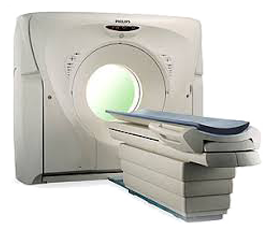Lab Tests & Radiology
Computed Tomography (CAT SCAN / CT)

What is a CT scan?
CT stands for "Computed Tomography" and is sometimes referred to as a CAT scan. In this procedure, a thin X-ray beam is rotated around the area of the body to be examined. Using complex mathematical processes called algorithms, the computer is able to generate cross-sectional or sliced images of the area of interest. CT scans are very detailed and are an excellent source of information for the physician.
How do I schedule my CT appointment?
- Patient must have a valid ID card and be eligible for treatment at Bayne-Jones Army Community Hospital.
- After your appointment with your provider, report to Radiology Reception Desk, 2nd floor, to schedule the exam (walk-in) or call in for an appointment.
- Depending on the type of exam ordered and the Radiologist review of the request, there may be preparations the patient must follow to complete the exam.
- Note: If you are unable to walk in to schedule the exam, please call 726-780-2234 or 726-780-2367
- Scheduling hours are Monday through Friday from 8 a.m. to 4:30 p.m.
How do I prepare for my CT scan?
Arrive 15 minutes prior to your scheduled exam. Please make arrangements for the supervision of your children under 12 as they are not allowed to be in our waiting room by themselves and we have no one available to watch them.
If you have been asked to take oral contrast, follow the instructions on the sheet given to you. CT contrast agents, both oral and intravenous, are used to highlight specific areas so that the organs, blood vessels, or tissues are more visible. By increasing the visibility of all surfaces of the organ or tissue being studied, they can help the radiologist determine the presence and extent of disease or injury.
What can I expect during my CT scan?
A technologist will bring you from the waiting area to the CT department. Your Identity will be confirmed. You will be asked key medical history and then helped onto the table and positioned for the exam. If your exam requires IV contrast (an Injection of contrast media), arrangements for the Insertion of an IV port will have been made one hour earlier.
A specially trained CT technologist will answer any questions you have before performing your exam. Once you are positioned on the table, the table you are on will begin to move through the circular opening in the machine. The scan is painless.
A technologist will be at a viewing window just outside of the exam room during the procedure. You will never be left alone.
If indicated, you will follow simple Pre-Recorded directions through a speaker, telling you when to hold your breath and when to breathe so that your study gets the best results.
How long will my CT scan take?
The scan itself should take five to 15 minutes, but please allow 30-45 minutes for your exam. Exams requiring oral contrast typically require the patient to be in the department a full two hours prior to the actual scanning.
Please note also this facility's ER can get busy which may cause a slight delay to scheduled patients. Emergencies do occur.
What will happen following my scan?
You may resume your activities unless instructed differently by your provider. You should feel no ill effects from your CT scan. If you have been given IV contrast, we suggest drinking several glasses of water throughout the rest of the day, voiding often.
How do I find out the results of my CT scan?
Your exam will be interpreted by a radiologist, dictated, then put in our computer system. Your provider will receive your results in about a week. If the radiologist finds something that needs immediate attention, the results will be communicated to your provider right away.
What if my child is having a CT scan?
For a CT scan to be successful, the patient is required to remain still during the exam. For this reason, some children may need to be sedated. We try to give the child a chance without sedation first for most non-contrast studies.
If your child is sedated, plan on an additional recovery time.
What types of exams are offered?
We have a variety of exams that we do at BJACH. We can turn a simple scan of a head into a 3D image with our workstations. We do many specialized studies for Surgery, Urology, EENT, Orthopedics and Emergency Room Trauma. These studies include:
- For studies of the head: Head, orbits, facial, sinuses, temporal bones, and 3D imaging.
- For studies of the neck: C-spine and soft tissue neck
- For studies of the chest: CTPA (PE) study, routine chest, high resolution, thoracic dissection and follow up nodules.
- For studies of the abdomen: Abdomen and pelvis, liver, pancreatitis, KUB, hematuria, endograft, angio, abdomen/pelvis with runoff, and abdominal aortic aneurysm.
- Other studies include: feet, ankles, knees, wrist, hands, and shoulders.